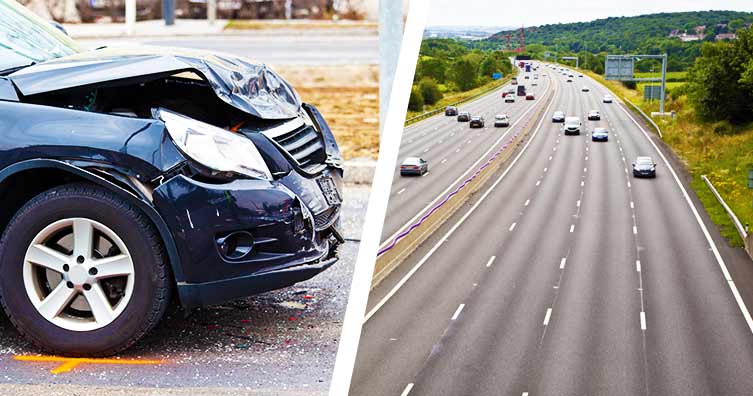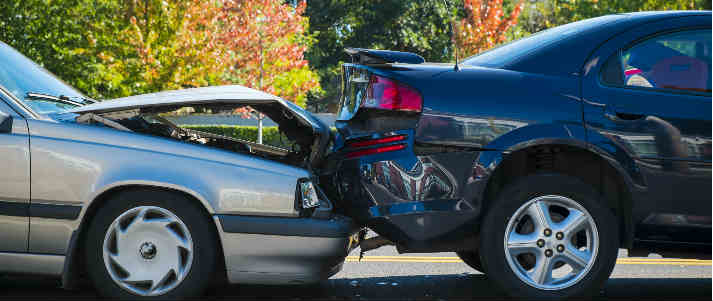Cheap car insurance for students
Need a car for university but put off by high insurance prices? Here's how to get cheaper car insurance.

Credit: Lisa S (left), Jason Winter (right) - Shutterstock
Owning a car isn't cheap, so driving as a university student is pretty much a luxury. Not only do you have to fork out for your wheels, but you also have to think about road tax, fuel and regular MOT tests.
However, car insurance is by far the biggest drain for any young driver. Premiums (the amount you pay your insurance company) tend to be way higher when you're less experienced on the road for obvious (but still infuriatingly unfair) reasons.
With this in mind, we thought it'd be worth taking a proper look at some ways students can significantly reduce their car insurance premiums.
Cheap car insurance
How much does car insurance cost?
You could easily be shelling out more than you need to, just because you've chosen a type of cover that isn't suited to your particular situation.
The cost of your overall insurance package depends on three things:
- The level of cover you go for
- The insurance company you choose
- Your own personal level of risk (i.e. how likely you are to have an accident or need to make a claim).
We'll take you through each of the points above to help you make the best decision and keep your insurance costs low.
How to choose the right level of car insurance cover

Credit: Robert Crum - Shutterstock
There are three main types of car insurance cover to choose from:
Third-party only car insurance
This covers damage and medical claims of other people, should you be liable for those damages in an accident.
If your own car gets damaged then you will, unfortunately, have to cover the cost yourself (making this cover great for old bangers, but probably not the best choice if you've got a brand new pride and joy).
Third-party, fire and theft car insurance
This is probably our top pick for student car insurance cover. Third-party, fire and theft (TPFT) cover can often be the most affordable option, but also offers theft cover – which can be important if you are living in a city for university and don't have anywhere safe to keep your car.
Remember, though, that with this option, you're still not covered for damages to your own vehicle if you cause an accident.
Fully comprehensive car insurance
This option has you completely covered – if you cause an accident or are a victim of one, then your car, their car and both of your medical costs will be covered (up to a certain point, of course).
If you're accident-prone then we recommend getting comprehensive cover to pay for damages – skimping now just to save an immediate buck or two could mean you end up having to shell out loads later.
The trick is just to be completely honest both with yourself and the insurer, as honesty goes a long way in the insurance game.
The obvious assumption would be that the cheapest option is third-party insurance, as that offers the least amount of cover – but don't be fooled!
Some students have reported saving up to £1,000 just by switching from third-party to comprehensive cover, so don't make any assumptions. The only solid advice we can give you here is to do as much research as possible and explore all of your options until you're sure you've found the best deal.
How to find cheap car insurance
Once you've chosen your level of cover and the type of premium you need, follow these steps to maximise the number of companies you compare to find the cheapest car insurance:
-
Check MoneySuperMarket
There are three top comparison sites you should use, and we recommend starting with this one. It doesn't take long to fill in the forms on MoneySuperMarket and it has prices from loads of top car insurers.
-
Check Confused.com
Next, give Confused.com a few minutes, as they often feature some insurers that other comparison sites don't include.
-
Compare the Market
Compare the Market has a wide selection of suppliers on offer for students and you'll even get Meerkat Movies and Meerkat Meals for an entire year.
-
Check Howden
Howden sells comprehensive car insurance for students. They also offer temporary insurance which means won't pay for the days you're not using your car. Result!
-
Have a look at Direct Line
It's worth having a quick check of what Direct Line has to offer to see if they can beat your current prices.
By using our quick comparison trick, you'll be able to whittle your options down to a few that are suitable. Once you've compiled a list of the best options (plus any pay-as-you-drive options that might interest you) then you can jump on the phone and start haggling.
Types of car insurance premium

Credit: Jevanto Productions - Shutterstock
The standard type of car insurance drivers normally go for entails choosing a policy that covers you and your car (to whichever level you've chosen from the above) at a set rate for the whole year. However, these types of premiums aren't likely to be the best option for young people, as rates tend to be higher for those under 25.
Instead, we'd recommend going for a more specialist policy which will give you the opportunity to have your premiums cut down thanks to infrequent driving or as a reward for driving safely on the roads.
There are two key types of specialist policies to consider: pay as you drive (PAYD) and pay how you drive (PHYD) – both are often referred to as telematics or 'black box insurance' due to the fact that both work by having a small box fitted to your car to measure how and when you drive. Temporary car insurance can also be a great option for students only driving for short periods of time.
Here's how they work:
Pay as you drive (PAYD)
This option is basically the same as a pay-as-you-go mobile contract – you only pay for cover as and when you use your car, meaning it's a great option if you use your car infrequently.
As mentioned, this option involves having a device fitted to your car that monitors how far and how frequently you drive, and charges you according to that (some insurers charge for sending out an engineer to fit the black box, so be aware of this).
It's not always the cheaper option, but this little black box could massively reduce your student car insurance premium if you work it to your advantage, so it's well worth checking out.
Here are some options currently on the market:
- Insure The Box – Choose your yearly miles (6,000+) which you can top up if necessary. You can even earn more through safe driving.
- By Miles – A great choice if you're a low-mileage driver. By Miles send you a little black box the size of a matchbox that tracks the number of miles you drive and charges you accordingly.
Pay how you drive (PHYD)
This option also involves having a GPS box attached to your car. PHYD is almost the same as PAYD, and there's some crossover between the two, but PHYD tends to focus more on how safely you drive as opposed to how many miles you do.
These black boxes keep an eye on a number of factors including acceleration, braking, cornering speed and more to determine what sort of driver you are and set your premium accordingly.
If you fancy yourself a safe driver, check out the following premiums:
- Co-op Young Driver Insurance – At your second renewal, they may offer you insurance without a black box.
- Ingenie – Ingenie is a good option for young people as you'll get feedback on your driving every 10 days. This way, you can improve quickly and help you earn your no-claims discount.
Be warned, however, that while good driving is rewarded with telematics insurance, bad driving could see your policy cancelled which is a serious black mark on your driving history.
Bonus: These boxes also act as an anti-theft device, allowing police to track via GPS. This means that if anyone is foolish enough to try and steal your wheels, it'll get tracked down!
Temporary student car insurance

Credit: Piranhi – Shutterstock
Short-term or temporary car insurance will cover you if you're only driving for a short period of time. For example, you might not want to take your car to university, but still want to drive it when you're home for the holidays.
With temporary car insurance, you're normally able to insure yourself for anything between one and 28 days. However, this can vary depending on which provider you go with.
Be warned that you are now legally obliged to insure any tax-registered car, even if it's locked in your parents' garage and isn't going anywhere during term time. The only way around this is if you obtain a statutory off-road notice (SORN) from the DVLA.
Can you use your parents' car insurance instead?
If you're the main driver of the car (the person who uses it the most), the insurance will have to be in your name, although you can add your parents to it as named drivers. This means you can't just add yourself to your parents' car insurance in the hope it will cover you in your own car.
If you're not keen on insuring your car for the whole year when you only plan on driving it when you're home for the holidays, it might be worth considering selling your car and simply taking out cover that will allow you to drive your parents' car (if they'll let you) during the summer months.
Best ways to lower the cost of your car insurance
Luckily, there are some ways to save money on your student car insurance by following these tips:
-
Ask for a discount
Insurers are eager to get students on their books, so use this to your advantage. There are some discounts you could be entitled to, so make sure to mention them during the haggling process:
- Multi-policy discount – If you come from a household with lots of cars, some insurers will give you a discounted rate if you insure all of them with the same company. Some insurers even allow you to cover all cars on one policy at a cheaper rate, so this is definitely worth enquiring about.
- No-claims discount – If you've never made a claim before, they might be willing to lower your premium.
- Introductory discount – Some companies offer an introductory discount which will then decrease or be removed depending on your driving.
-
Opt for a higher excess
Your student car insurance excess is the amount you're willing to pay out of your own pocket if you get into a crash that's your fault.
For a lot of students, the excess will be set at a certain level. For example, if your excess is £500 and you get into a crash that causes £3,000 of damage, you'll have to pay £500 before the insurance company will cough up the rest to cover the repairs.
If you volunteer to have a higher excess then the insurer will take some money off of your premium (you're basically saying "I think the chances of me causing an accident are so slim that I'll offer to pay a large sum from my own pocket if I do").
Therefore, it's important to be realistic here, as you don't want to squander your hard work trying to save money by having to fork out major cash if you have a crash.
-
Don't add modifications

Credit: Highway Patrol Images - Flickr
Spoilers, neon lights, tinted windows... none of these are a good idea from an insurance perspective (neither is glueing hundreds of cuddly toys to the paintwork – just FYI). Not only are they unimpressive to the general public, but they also don't impress insurers either.
Their assumption is that your car will be more attractive to thieves if you add extra cosmetic features, and they'll also think of the obvious stereotype that you're likely to be cruising about town revving your engine like a boy racer.
-
Take a Pass Plus Test
Pass Plus tests are government-run tests that offer new drivers a chance to show they're confident in various different circumstances on the road. By taking the Pass Plus, you could decrease your premium by up to 30%.
There's no set cost for the Pass Plus scheme as it depends on your instructor, but it can cost between £150 – £250. This might seem like a lot to fork out for the test, but it could be worth it in the long run. Plus, it'll only set you back £20 if you live in Wales.
Just keep in mind that not all insurance providers offer a Pass Plus discount. Before you decide to pay for the test, we suggest comparing the prices of insurance quotes with and without Pass Plus to see if it's worth it for you.
-
Park off-road and increase safety
If you can manage to secure off-road parking or a space in a garage, you'll see your premium drop substantially, so this might be something worth considering when looking at accommodation. Basically, if the insurer feels that your car will be more secure, your premium will drop.
You can also cut your costs by increasing the general safety of your car. Grab yourself a wheel lock and a car alarm, and make sure that you tell your insurer about them.
-
Build up a no-claims bonus
If you've never had a crash before, you'll have built up a no-claims bonus. If you save one up for around six years you could even be eligible for as much as a 60% discount. However, the minute you have to claim for something, the bonus is scrapped – so this is a big incentive to take as much care on the roads as you possibly can.
Most students won't have been driving long enough to get a massive no-claims bonus, so this is more just a heads-up for the future – another reason to avoid any scuffles on the road.
-
Add a named driver
Simply add an experienced driver as a named driver and this will lower the price of your premium. This will (in theory, of course!) lower the risk of an accident in your insurer's mind, simply because the more names added to the policy, the less time you'll spend behind the wheel.
We just have to stress that you can't name the experienced driver as the main driver of your car if that's not the case. This manoeuvre (called 'fronting') is well-known by insurers, and if you get caught, the repercussions are tough.
-
Choose the right car
Taking a step back and thinking carefully about the kind of car you want to drive will ultimately determine your insurance premium. Choosing a powerful car with a soft-top roof will set you back way more than a VW Polo – the 'safer' your car the less you'll pay, essentially.
Check out this guide from the IIHS (Insurance Institute for Highway Safety) for a bit more info on which cars are in which 'class' for insurers, as well as which cars are safest on the road.
-
Use university car clubs
Check with your university to see if there are any car clubs on-site or in the area. These basically allow you to hire a car at university on a short-term basis, so you get the benefits of driving without having to fork out upfront for a car and insurance.
With Co Wheels, for instance, you pay a minimum of £44 a day (or £5.50 an hour) for car hire and they're based in over 20 locations around the country. To join, you have to be at least 19 years old and have held your license for 12 months.
Common car insurance mistakes to avoid

Make sure to avoid these mistakes when getting car insurance:
-
Never put someone else as the main driver
It might seem like a good idea to add one of your parents to the insurance (perfectly legal) and name them as the main driver in order to bring the cost down (totally illegal – this is called 'fronting').
The repercussions of this trick – a hefty fine, a cancelled policy and a black mark for future insurers – just ain't worth it.
-
Don't lie in your insurance application
A little white lie on an insurance application might seem like a good idea to make super savings, but it's classed as fraud and can even result in a criminal record. This is serious business!
-
Never auto-renew your policy
You would think that opting to renew your policy automatically with a company would get you a good deal, but this is exactly how they sting you. Insurance companies hike their prices each year, and they count on your complacency as a way to make cash.
Set a calendar reminder and do your research again. Changing policies year by year is perfectly normal and could save you some serious dough.
You can also ask your current provider to match any cheaper quotes you've seen. If you don't ask, you don't get.
-
Don't under-insure to get a lower premium
If your car is worth £6,000, you need to insure it for that amount.
Pretending that your car is worth less will, of course, bring your premium down – but if your insurer catches on to your game, they'll not only pay out less for any damages but they could even choose to withdraw your policy.
-
Don't go for the cheapest car insurance
As we mentioned earlier, third-party insurance might seem like the best and cheapest option at first glance, but in reality, it could result in you paying out way more cash to cover yourself if you're involved in any accidents.
The trick, as always, is to do your research and do it thoroughly.
-
Don't pay in monthly instalments
We know it's a big ask to pay out for the whole year in one go, but unfortunately, if you opt to pay in monthly instalments you could be paying anything up to around 36% in interest.
If you can't afford to pay it all in one go, consider paying it with a 0% credit card which you can then pay off in instalments throughout the year.
When using a 0% credit card, you'll still have to make the monthly minimum payment, and you'll have to repay in full before the 0% period is up to avoid paying interest. If you're not sure you can manage this, don't do it!
-
Don't let your insurance run out
Yes, we know, we've made this a bit difficult by saying you shouldn't auto-renew your policy, but while auto-renewing is financially risky, it's even riskier to let your insurance policy expire before you take out a new one.
Protect yourself by setting a calendar reminder a couple of weeks before your policy is due to expire and get on the hunt for a new one ASAP.
-
Don't assume you can drive your mates' cars
This is a major schoolboy error of judgement. Generally, your fully comprehensive insurance will only cover you when driving the car that you're registered to. Make sure you read your policy thoroughly and know exactly what you're covered for.
Of course, it goes without saying for all of the options and tips above that you should always make sure you check your cover fully. Make sure you read through all of the small print and possible clauses that you may get stung by.
Think about what's important to you, and decide on your cover according to your needs, not just the price tag.
Once you're all set up with your car at uni, why not drive for Uber in your spare time?













